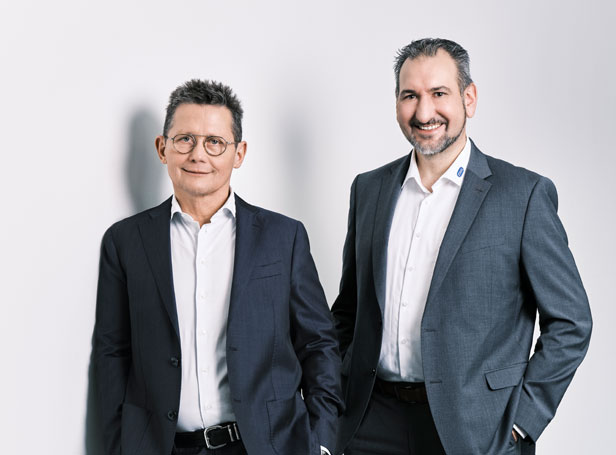With 5G, a new mobile communication technology is available to extend the areas of application of wireless communication in various ways and to boost efficiency within businesses. In this interview, Stephan Schultz and Patrick Neuhalfen describe the additional benefits of 5G and 5G campus networks and explain important points to note when starting to use this technology for the first time.
1. 5G is a hot topic. Can you give us some typical application examples for 5G in the process industry?
Stephan Schultz: First of all, it's important to point out that the use of 5G in the process industry is still at a very early stage. Several studies and pilot trials have already been carried out and it's clear that 5G will be an important component of digitalisation in the industry. At the moment, the most common applications involve the use of mobile devices. The aim is to assist technical personnel by helping them document maintenance work and by providing central access to documents like operating instructions, or remote video support from experts. 5G has even more to offer. Whether it's assistance with real-time applications like self-driving conveyor vehicles or establishing infrastructure which can transmit information from thousands of sensors for status monitoring. And you can make phone calls as well, of course.
2. What are 5G campus networks and what role do they play for users in the process industry?
Patrick Neuhalfen: 5G campus networks are private, locally operated 5G networks. These campus networks are set up in parallel to publicly available networks. This means that a company from the chemical, pharmaceutical or energy sector, for instance, can become a network operator on their premises. 5G campus networks can play a crucial role in the process industry because they make reliable and powerful wireless connectivity possible in industrial environments which might not be covered by public 5G networks.
3. What are the benefits of 5G campus networks compared to public 5G networks?
Patrick Neuhalfen: The benefits of 5G campus networks compared to public 5G networks are that they can be individually adapted, are more secure in terms of data sovereignty, ensure better control of the network performance, and offer the ability to implement tailored solution for specific applications.
4. And in what way is 5G better than WiFi?
Stephan Schultz: Both technologies – 5G and also the latest version of WiFi – offer a powerful, digital network infrastructure. They are technically very similar in many aspects, in fact far more than we are aware. So it's not possible to make a blanket statement saying that 5G is better than WiFi or the other way round. There are actually good reasons to use both of these technologies. In any case, the public 5G network offers the benefit that applications work beyond the boundaries of company premises and no costs are incurred for investing in network infrastructure. Depending on the configuration, 5G campus networks offer benefits for mobile applications, signal coverage over larger areas and handling of a large number of participants. As already mentioned, WiFi is on the same level in multiple parameters and boasts the major benefit that many devices have a compatible interface and no licences are required for operation.
5. Are establishment and implementation complicated, and what do they cost?
Stephan Schultz: Careful planning and implementation are required when setting up a 5G campus network in order to ensure that user requirements are met. After this step, many questions need to be answered, and this requires specialist knowledge. These include the procurement of licences from the Federal Network Agency (Bundesnetzagentur) and choosing the right components. It's a bit like building private homes: Very few people have sufficient knowledge at the start of the project. To make it easier to start using this technology and help users until they reach the commissioning stage, R. STAHL – with its explosion protection expertise – and Lufthansa Industry Solutions – as an expert in the topic of "5G campus" – offer a starter workshop and further service packages. This makes it possible to calculate the costs of a project of this kind. And that's not all – the licence fees are much lower than the high sums spent during the auction of the national mobile network licences would have you think.
6. What do companies have to note when setting up a 5G campus network in hazardous areas?
Stephan Schultz: From the point of view of explosion protection, firstly the limit values for the radiation of radio signals must be considered. This is also the case if the signal is generated outside the hazardous area in order to transmit it from there to production, where there are hazardous areas. A limit value of 2 W always applies to explosion group IIC. Inside the production facilities, hard-to-reach areas like underground sections of the system can be covered by additional signal amplifiers or WiFi access points. Compatible enclosure systems are ideal for using these devices in hazardous areas. It goes without saying that the devices used – whether they are portable or permanently installed – also must have the necessary explosion protection.
7. Are enough terminal devices available for 5G campus networks?
Patrick Neuhalfen: A wide selection of explosion-protected terminal devices is already available for use in 5G campus networks. However, it's important to note that not all 5G-capable devices are also suitable for use in campus networks. The devices available from R. STAHL are tested in advance. And that's not all – companies should consider future applications and technologies when planning 5G networks in order to ensure that the network can continue to meet requirements in the long term.
These articles might also interest you







![[Translate to Englisch:] [Translate to Englisch:]](/fileadmin/user_upload/mitarbeiter/01_DE/07_Blog/00_Allgemein/blog-explosionsschutz-rstahl-startseite-279x205.jpg)
![[Translate to Englisch:] [Translate to Englisch:]](/fileadmin/user_upload/mitarbeiter/01_DE/07_Blog/00_Allgemein/blog-explosionsschutz-rstahl-ueber-den-blog-279x205.jpg)
![[Translate to Englisch:] [Translate to Englisch:]](/fileadmin/user_upload/mitarbeiter/01_DE/07_Blog/00_Allgemein/blog-explosionsschutz-rstahl-autoren-279x205.jpg)
![[Translate to Englisch:] [Translate to Englisch:]](/fileadmin/user_upload/mitarbeiter/01_DE/07_Blog/00_Allgemein/blog-explosionsschutz-rstahl-newsletter-expert-mail-279x205.jpg)
Write new comment